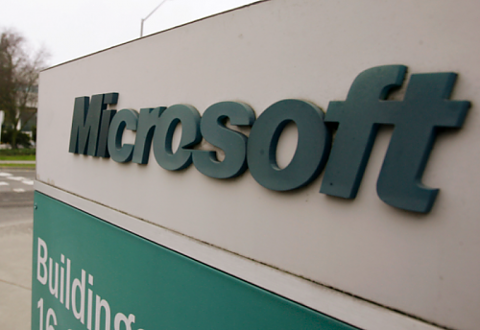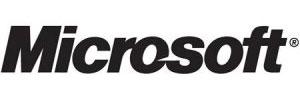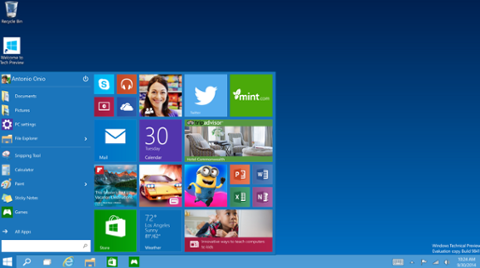 Dediu's projection of Windows' decline.[/caption] In his latest Asymco blog post, analyst Horace Dediu suggested that Windows’ share of the personal-computing market is declining at a faster rate than many believe, once Microsoft’s cash cow is put in direct competition with Android, iOS, and other platforms built for tablets. Now that Windows is on tablets in addition to “traditional” PCs, he argued, the gloves are off: the operating system must join the iPad, Google’s Nexus 7, and other tablets on the broader playing field. In that context, Windows’ share of the personal-computing market has dipped past 60 percent on its way to 50 percent. The big question is whether it’ll keep plunging. “If Windows tablets start growing as fast as the tablet market overall then Windows could stabilize in share,” Dediu wrote. “But if Android and iOS tablets follow their phone brethren in growth then it will be far harder for Microsoft to maintain share.” Despite that gloomy scenario, Dediu doesn’t necessarily see a market-share dip as a cause for concern on Microsoft’s part. The market for computing devices will probably hit 4 billion users within the next five years, assuring a healthy revenue stream for even those companies with a minority share. “Even if Windows dips to only 20 [percent] of the world’s computing market it will still be perfectly ‘viable’ for some time to come,” he wrote. While it’s certainly true that a couple hundred million customers can provide enough revenue to keep a large corporation’s lights on for another quarter, Windows is something of a special case. Along with Office, its revenues power a significant portion of Microsoft’s bottom line, and the company counts on new versions every few years to spike its earnings into shareholder-pleasing territory. All that Windows (and Office) money also allows Microsoft to launch money-losing projects without betting the company. Without that monetary base, for example, it’s possible that the Xbox (which bled money for the first few years of its existence) wouldn’t have survived long enough to become a viable platform from a financial perspective—much less the center of Microsoft’s future plans for living room domination. All that money has helped Microsoft grow and maintain its various cloud-computing projects, which haven’t yet produced blockbuster revenues. Windows and Office money, in other words, allows Microsoft to compete in new areas against tough rivals such as Google and Apple. If fewer people buy laptops or tablets loaded with Windows, and decline to load Office onto those machines (or pay for an Office 365 subscription), it weakens Microsoft’s ability to compete in the broader tech marketplace. In a scenario where Windows’ market share declines to a fraction of its previous highs, Microsoft could find itself squeezed into a sort of Alamo—frantically evolving its core properties in a bid to keep up with the latest thing, and without the cash to make the aggressive moves necessary to regain its former prominence. Image: Asymco/Horace Dediu
Dediu's projection of Windows' decline.[/caption] In his latest Asymco blog post, analyst Horace Dediu suggested that Windows’ share of the personal-computing market is declining at a faster rate than many believe, once Microsoft’s cash cow is put in direct competition with Android, iOS, and other platforms built for tablets. Now that Windows is on tablets in addition to “traditional” PCs, he argued, the gloves are off: the operating system must join the iPad, Google’s Nexus 7, and other tablets on the broader playing field. In that context, Windows’ share of the personal-computing market has dipped past 60 percent on its way to 50 percent. The big question is whether it’ll keep plunging. “If Windows tablets start growing as fast as the tablet market overall then Windows could stabilize in share,” Dediu wrote. “But if Android and iOS tablets follow their phone brethren in growth then it will be far harder for Microsoft to maintain share.” Despite that gloomy scenario, Dediu doesn’t necessarily see a market-share dip as a cause for concern on Microsoft’s part. The market for computing devices will probably hit 4 billion users within the next five years, assuring a healthy revenue stream for even those companies with a minority share. “Even if Windows dips to only 20 [percent] of the world’s computing market it will still be perfectly ‘viable’ for some time to come,” he wrote. While it’s certainly true that a couple hundred million customers can provide enough revenue to keep a large corporation’s lights on for another quarter, Windows is something of a special case. Along with Office, its revenues power a significant portion of Microsoft’s bottom line, and the company counts on new versions every few years to spike its earnings into shareholder-pleasing territory. All that Windows (and Office) money also allows Microsoft to launch money-losing projects without betting the company. Without that monetary base, for example, it’s possible that the Xbox (which bled money for the first few years of its existence) wouldn’t have survived long enough to become a viable platform from a financial perspective—much less the center of Microsoft’s future plans for living room domination. All that money has helped Microsoft grow and maintain its various cloud-computing projects, which haven’t yet produced blockbuster revenues. Windows and Office money, in other words, allows Microsoft to compete in new areas against tough rivals such as Google and Apple. If fewer people buy laptops or tablets loaded with Windows, and decline to load Office onto those machines (or pay for an Office 365 subscription), it weakens Microsoft’s ability to compete in the broader tech marketplace. In a scenario where Windows’ market share declines to a fraction of its previous highs, Microsoft could find itself squeezed into a sort of Alamo—frantically evolving its core properties in a bid to keep up with the latest thing, and without the cash to make the aggressive moves necessary to regain its former prominence. Image: Asymco/Horace Dediu Can Microsoft Survive If Windows Doesn’t Dominate?
[caption id="attachment_10148" align="aligncenter" width="429"]  Dediu's projection of Windows' decline.[/caption] In his latest Asymco blog post, analyst Horace Dediu suggested that Windows’ share of the personal-computing market is declining at a faster rate than many believe, once Microsoft’s cash cow is put in direct competition with Android, iOS, and other platforms built for tablets. Now that Windows is on tablets in addition to “traditional” PCs, he argued, the gloves are off: the operating system must join the iPad, Google’s Nexus 7, and other tablets on the broader playing field. In that context, Windows’ share of the personal-computing market has dipped past 60 percent on its way to 50 percent. The big question is whether it’ll keep plunging. “If Windows tablets start growing as fast as the tablet market overall then Windows could stabilize in share,” Dediu wrote. “But if Android and iOS tablets follow their phone brethren in growth then it will be far harder for Microsoft to maintain share.” Despite that gloomy scenario, Dediu doesn’t necessarily see a market-share dip as a cause for concern on Microsoft’s part. The market for computing devices will probably hit 4 billion users within the next five years, assuring a healthy revenue stream for even those companies with a minority share. “Even if Windows dips to only 20 [percent] of the world’s computing market it will still be perfectly ‘viable’ for some time to come,” he wrote. While it’s certainly true that a couple hundred million customers can provide enough revenue to keep a large corporation’s lights on for another quarter, Windows is something of a special case. Along with Office, its revenues power a significant portion of Microsoft’s bottom line, and the company counts on new versions every few years to spike its earnings into shareholder-pleasing territory. All that Windows (and Office) money also allows Microsoft to launch money-losing projects without betting the company. Without that monetary base, for example, it’s possible that the Xbox (which bled money for the first few years of its existence) wouldn’t have survived long enough to become a viable platform from a financial perspective—much less the center of Microsoft’s future plans for living room domination. All that money has helped Microsoft grow and maintain its various cloud-computing projects, which haven’t yet produced blockbuster revenues. Windows and Office money, in other words, allows Microsoft to compete in new areas against tough rivals such as Google and Apple. If fewer people buy laptops or tablets loaded with Windows, and decline to load Office onto those machines (or pay for an Office 365 subscription), it weakens Microsoft’s ability to compete in the broader tech marketplace. In a scenario where Windows’ market share declines to a fraction of its previous highs, Microsoft could find itself squeezed into a sort of Alamo—frantically evolving its core properties in a bid to keep up with the latest thing, and without the cash to make the aggressive moves necessary to regain its former prominence. Image: Asymco/Horace Dediu
Dediu's projection of Windows' decline.[/caption] In his latest Asymco blog post, analyst Horace Dediu suggested that Windows’ share of the personal-computing market is declining at a faster rate than many believe, once Microsoft’s cash cow is put in direct competition with Android, iOS, and other platforms built for tablets. Now that Windows is on tablets in addition to “traditional” PCs, he argued, the gloves are off: the operating system must join the iPad, Google’s Nexus 7, and other tablets on the broader playing field. In that context, Windows’ share of the personal-computing market has dipped past 60 percent on its way to 50 percent. The big question is whether it’ll keep plunging. “If Windows tablets start growing as fast as the tablet market overall then Windows could stabilize in share,” Dediu wrote. “But if Android and iOS tablets follow their phone brethren in growth then it will be far harder for Microsoft to maintain share.” Despite that gloomy scenario, Dediu doesn’t necessarily see a market-share dip as a cause for concern on Microsoft’s part. The market for computing devices will probably hit 4 billion users within the next five years, assuring a healthy revenue stream for even those companies with a minority share. “Even if Windows dips to only 20 [percent] of the world’s computing market it will still be perfectly ‘viable’ for some time to come,” he wrote. While it’s certainly true that a couple hundred million customers can provide enough revenue to keep a large corporation’s lights on for another quarter, Windows is something of a special case. Along with Office, its revenues power a significant portion of Microsoft’s bottom line, and the company counts on new versions every few years to spike its earnings into shareholder-pleasing territory. All that Windows (and Office) money also allows Microsoft to launch money-losing projects without betting the company. Without that monetary base, for example, it’s possible that the Xbox (which bled money for the first few years of its existence) wouldn’t have survived long enough to become a viable platform from a financial perspective—much less the center of Microsoft’s future plans for living room domination. All that money has helped Microsoft grow and maintain its various cloud-computing projects, which haven’t yet produced blockbuster revenues. Windows and Office money, in other words, allows Microsoft to compete in new areas against tough rivals such as Google and Apple. If fewer people buy laptops or tablets loaded with Windows, and decline to load Office onto those machines (or pay for an Office 365 subscription), it weakens Microsoft’s ability to compete in the broader tech marketplace. In a scenario where Windows’ market share declines to a fraction of its previous highs, Microsoft could find itself squeezed into a sort of Alamo—frantically evolving its core properties in a bid to keep up with the latest thing, and without the cash to make the aggressive moves necessary to regain its former prominence. Image: Asymco/Horace Dediu
 Dediu's projection of Windows' decline.[/caption] In his latest Asymco blog post, analyst Horace Dediu suggested that Windows’ share of the personal-computing market is declining at a faster rate than many believe, once Microsoft’s cash cow is put in direct competition with Android, iOS, and other platforms built for tablets. Now that Windows is on tablets in addition to “traditional” PCs, he argued, the gloves are off: the operating system must join the iPad, Google’s Nexus 7, and other tablets on the broader playing field. In that context, Windows’ share of the personal-computing market has dipped past 60 percent on its way to 50 percent. The big question is whether it’ll keep plunging. “If Windows tablets start growing as fast as the tablet market overall then Windows could stabilize in share,” Dediu wrote. “But if Android and iOS tablets follow their phone brethren in growth then it will be far harder for Microsoft to maintain share.” Despite that gloomy scenario, Dediu doesn’t necessarily see a market-share dip as a cause for concern on Microsoft’s part. The market for computing devices will probably hit 4 billion users within the next five years, assuring a healthy revenue stream for even those companies with a minority share. “Even if Windows dips to only 20 [percent] of the world’s computing market it will still be perfectly ‘viable’ for some time to come,” he wrote. While it’s certainly true that a couple hundred million customers can provide enough revenue to keep a large corporation’s lights on for another quarter, Windows is something of a special case. Along with Office, its revenues power a significant portion of Microsoft’s bottom line, and the company counts on new versions every few years to spike its earnings into shareholder-pleasing territory. All that Windows (and Office) money also allows Microsoft to launch money-losing projects without betting the company. Without that monetary base, for example, it’s possible that the Xbox (which bled money for the first few years of its existence) wouldn’t have survived long enough to become a viable platform from a financial perspective—much less the center of Microsoft’s future plans for living room domination. All that money has helped Microsoft grow and maintain its various cloud-computing projects, which haven’t yet produced blockbuster revenues. Windows and Office money, in other words, allows Microsoft to compete in new areas against tough rivals such as Google and Apple. If fewer people buy laptops or tablets loaded with Windows, and decline to load Office onto those machines (or pay for an Office 365 subscription), it weakens Microsoft’s ability to compete in the broader tech marketplace. In a scenario where Windows’ market share declines to a fraction of its previous highs, Microsoft could find itself squeezed into a sort of Alamo—frantically evolving its core properties in a bid to keep up with the latest thing, and without the cash to make the aggressive moves necessary to regain its former prominence. Image: Asymco/Horace Dediu
Dediu's projection of Windows' decline.[/caption] In his latest Asymco blog post, analyst Horace Dediu suggested that Windows’ share of the personal-computing market is declining at a faster rate than many believe, once Microsoft’s cash cow is put in direct competition with Android, iOS, and other platforms built for tablets. Now that Windows is on tablets in addition to “traditional” PCs, he argued, the gloves are off: the operating system must join the iPad, Google’s Nexus 7, and other tablets on the broader playing field. In that context, Windows’ share of the personal-computing market has dipped past 60 percent on its way to 50 percent. The big question is whether it’ll keep plunging. “If Windows tablets start growing as fast as the tablet market overall then Windows could stabilize in share,” Dediu wrote. “But if Android and iOS tablets follow their phone brethren in growth then it will be far harder for Microsoft to maintain share.” Despite that gloomy scenario, Dediu doesn’t necessarily see a market-share dip as a cause for concern on Microsoft’s part. The market for computing devices will probably hit 4 billion users within the next five years, assuring a healthy revenue stream for even those companies with a minority share. “Even if Windows dips to only 20 [percent] of the world’s computing market it will still be perfectly ‘viable’ for some time to come,” he wrote. While it’s certainly true that a couple hundred million customers can provide enough revenue to keep a large corporation’s lights on for another quarter, Windows is something of a special case. Along with Office, its revenues power a significant portion of Microsoft’s bottom line, and the company counts on new versions every few years to spike its earnings into shareholder-pleasing territory. All that Windows (and Office) money also allows Microsoft to launch money-losing projects without betting the company. Without that monetary base, for example, it’s possible that the Xbox (which bled money for the first few years of its existence) wouldn’t have survived long enough to become a viable platform from a financial perspective—much less the center of Microsoft’s future plans for living room domination. All that money has helped Microsoft grow and maintain its various cloud-computing projects, which haven’t yet produced blockbuster revenues. Windows and Office money, in other words, allows Microsoft to compete in new areas against tough rivals such as Google and Apple. If fewer people buy laptops or tablets loaded with Windows, and decline to load Office onto those machines (or pay for an Office 365 subscription), it weakens Microsoft’s ability to compete in the broader tech marketplace. In a scenario where Windows’ market share declines to a fraction of its previous highs, Microsoft could find itself squeezed into a sort of Alamo—frantically evolving its core properties in a bid to keep up with the latest thing, and without the cash to make the aggressive moves necessary to regain its former prominence. Image: Asymco/Horace Dediu 

